Samsung Galaxy S22 Ultra vs iPhone 13 Pro Max: heavyweight phone contenders
The Samsung Galaxy S22 Ultra is shaping up to be the most exciting phone of early 2022. But if it’s to rule the calendar year like its predecessor, the Galaxy S21 Ultra, it’s going to have to take on the iPhone 13 Pro Max.
Apple’s latest super-sizer has set new standards in camera quality, stamina, and performance. Can the Galaxy S22 Ultra match it point for point?
We won’t have a full answer to that until we’ve spent some quality time with the new phone, but what we have now is the raw specs. Let’s compare and contrast the two.
Samsung Galaxy S22 Ultra vs iPhone 13 Pro Max price and availability
The Samsung Galaxy S22 Ultra was revealed to the world on February 9, 2022. Prices start from $1,199.99 / £1,149 / AU$1,849 for the 8GB RAM/128GB model, moving up to $1,299.99 / £1249 / AU$1,999 for 12GB/256GB, then $1,399.99 / £1,329 / AU$2,149 for 12GB/512GB, and topping out at $1,599.99 / £1,499 / AU$2,449 for the 12GB/1TB top dog.
The iPhone 13 Pro Max hit shops on September 24, 2021. Prices start from $1,099 / £1,049 / AU$1,699 for the 128GB model, moving up to $1,199 / £1,149 / AU$1,869 for 256GB, then $1,399 / £1,349 / AU$2,219 for 512GB, and topping out at $1,599 / £1,549 / AU$2,569 for the 1TB model.
Design
It’s not just the cost of these two phones that earns them the label of ‘pocket-troubling’. They’re also seam-bustingly massive.
The Galaxy S22 Ultra measures 163 x 77.9 x 8.9mm, while the iPhone 13 Pro Max measures 160.8 x 78.1 x 7.65mm. This makes the Samsung much taller and fatter than its opposition, and just a fraction narrower.
However, Samsung’s phone is also lighter, weighing 229g compared to the iPhone 13 Pro’s 238g. Let’s not split hairs though, they’re both very heavy.
The reason for the iPhone 13 Pro Max’s heavier status is likely down to its use of stainless steel in the frame. Samsung has used aluminum, which is lighter, if not quite as tough or premium-feeling.
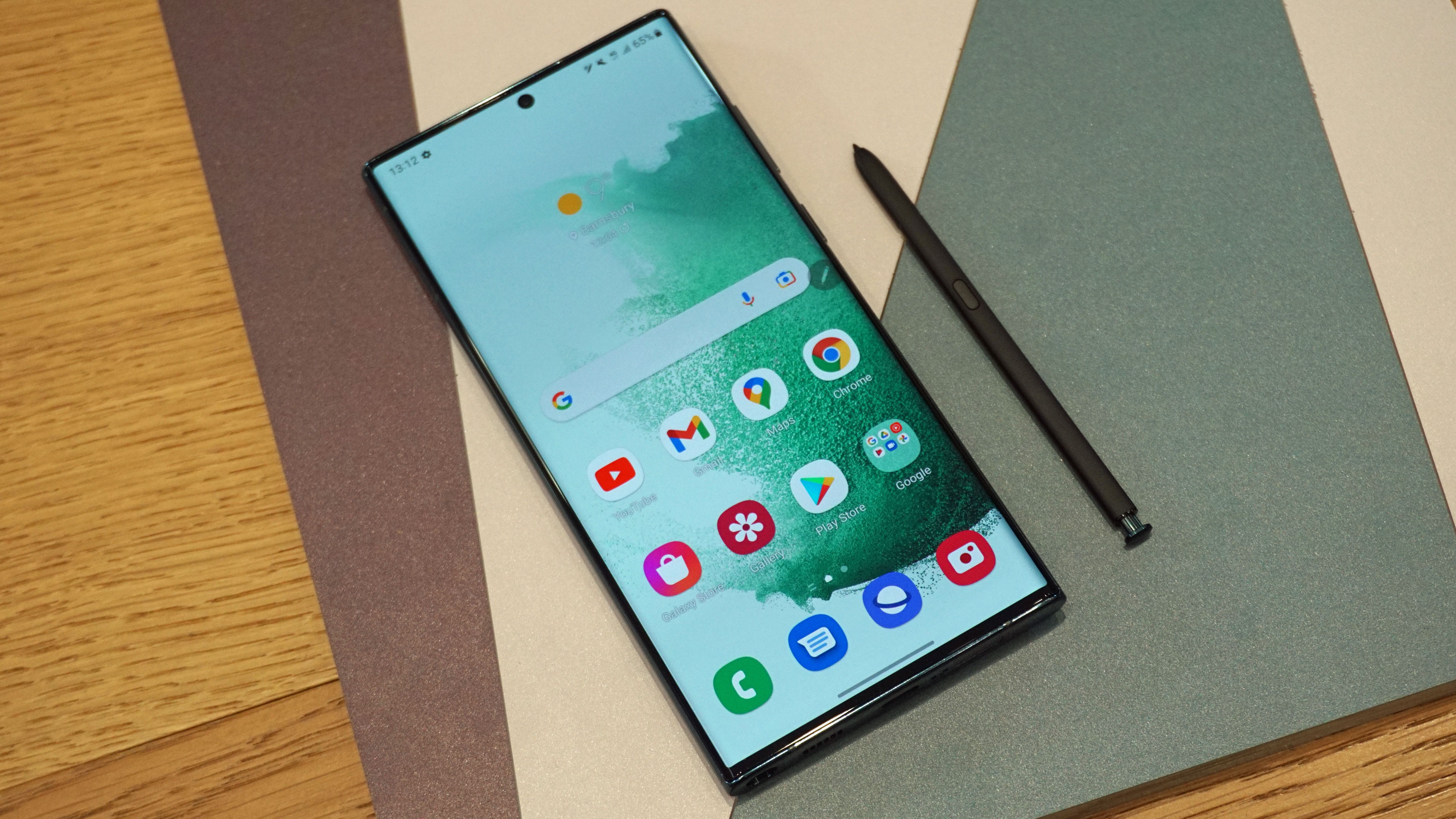
In terms of aesthetics, there’s not much that these two phones have in common. The Galaxy S22 Ultra is a little boxier than the rest of the Galaxy S22 range, with flat top and bottom edges. But its sides are curved, and the display subtly fades into the body.
Conversely, the iPhone 13 Pro Max is all sharp corners and flat surfaces, including a dead-flat display.
However, it’s the Galaxy S22 Ultra that manages to get its rear panel flatter, with no bulging camera module to speak off. By contrast, the iPhone 13 Pro Max positions its three camera lenses on a glass blister of sorts, which somewhat spoils the iPhone’s clean lines.
Both phones have an IP68 rating, so they’ll stand up to fine dust and an extended dip in a pool.
One other crucial design difference here relates to the display notches. While the Galaxy S22 Ultra uses a modest hole-punch notch, the iPhone 13 Pro has a full notch that eats into more of the display.
Apple has reduced its iconic display notch by 20% and the iPhone 13 Pro Max’s larger display makes it less of an eyesore than on the other iPhones in the range. However, it’s still not as elegant as Samsung’s centrally placed circle.
Display
The Samsung Galaxy S22 Ultra’s display is bigger, sharper, and brighter than the iPhone 13 Pro Max equivalent, and it’s also more energy-efficient.
Let’s break those stats down. The Galaxy S22 Ultra display is a 6.8-inch AMOLED with a 3200 x 1440 (QHD+) resolution. The iPhone 13 Pro Max display is a 6.7-inch OLED with a 2778 x 1284 resolution.
Both screens refresh at a maximum rate of 120Hz, which makes them equally smooth. But while the Galaxy S22 Ultra can scale down as low as 1Hz, the iPhone 13 Pro Max can only scale down to 10Hz.
This doesn’t mean anything in terms of image quality, but it might just help the Galaxy S22 Ultra get closer to the iPhone 13 Pro Max’s formidable stamina. But more on that later.
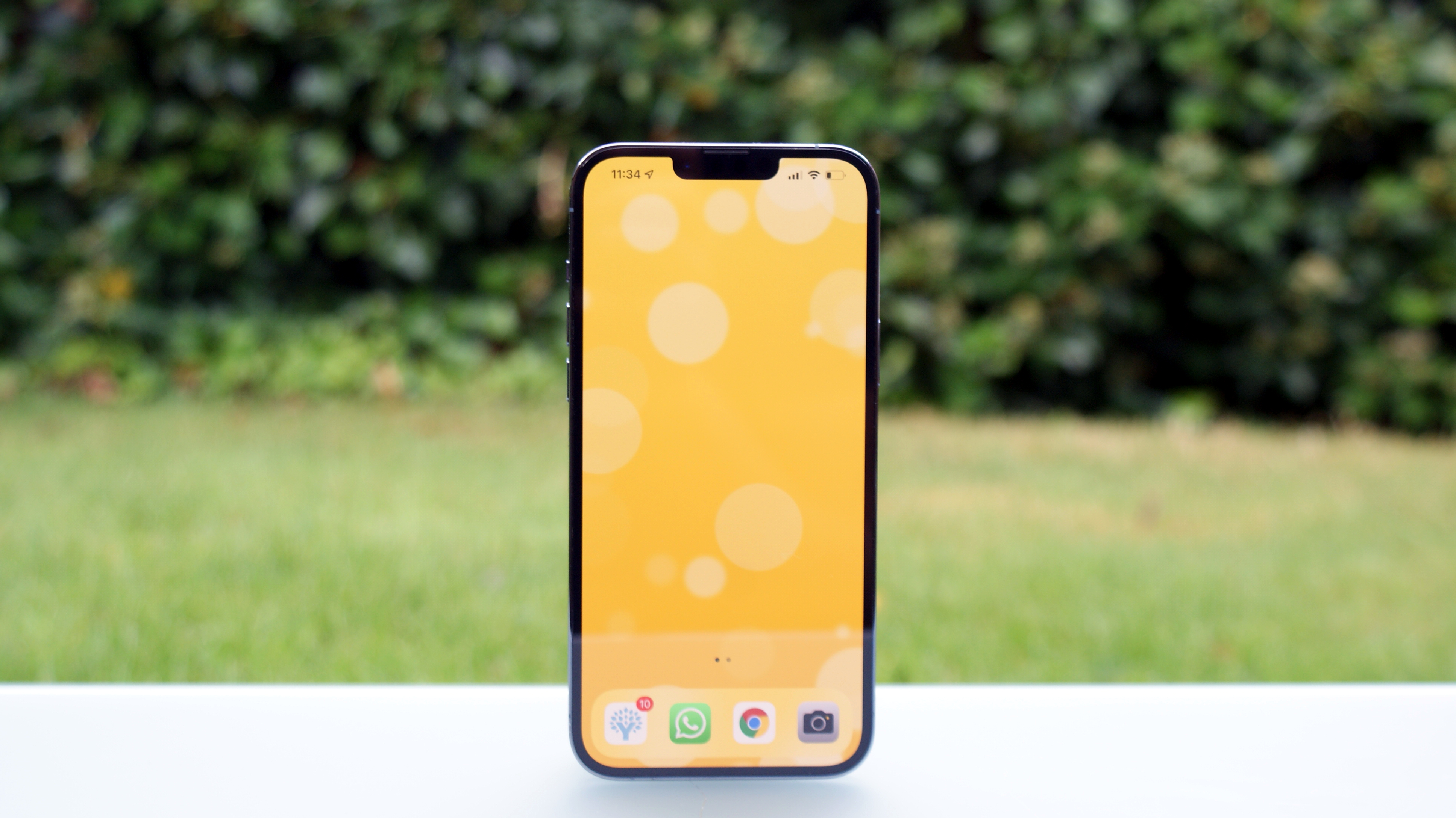
Samsung’s display can get much brighter in peak ambient brightness, to the tune of an eyeball-searing 1,750 nits. The iPhone 13 Pro Max can hit a maximum of 1,200 nits.
Despite all this, we can’t judge which is the better display until we’ve spent some quality time with the Galaxy S22 Ultra. We have to discern how color-accurate and balanced Samsung’s screen is compared to its superb rival, which has been expertly tuned.
Samsung is the undisputed master of AMOLED display production and tuning, though, so we have no doubt it can back up that spec advantage with a superior viewing experience.
Camera
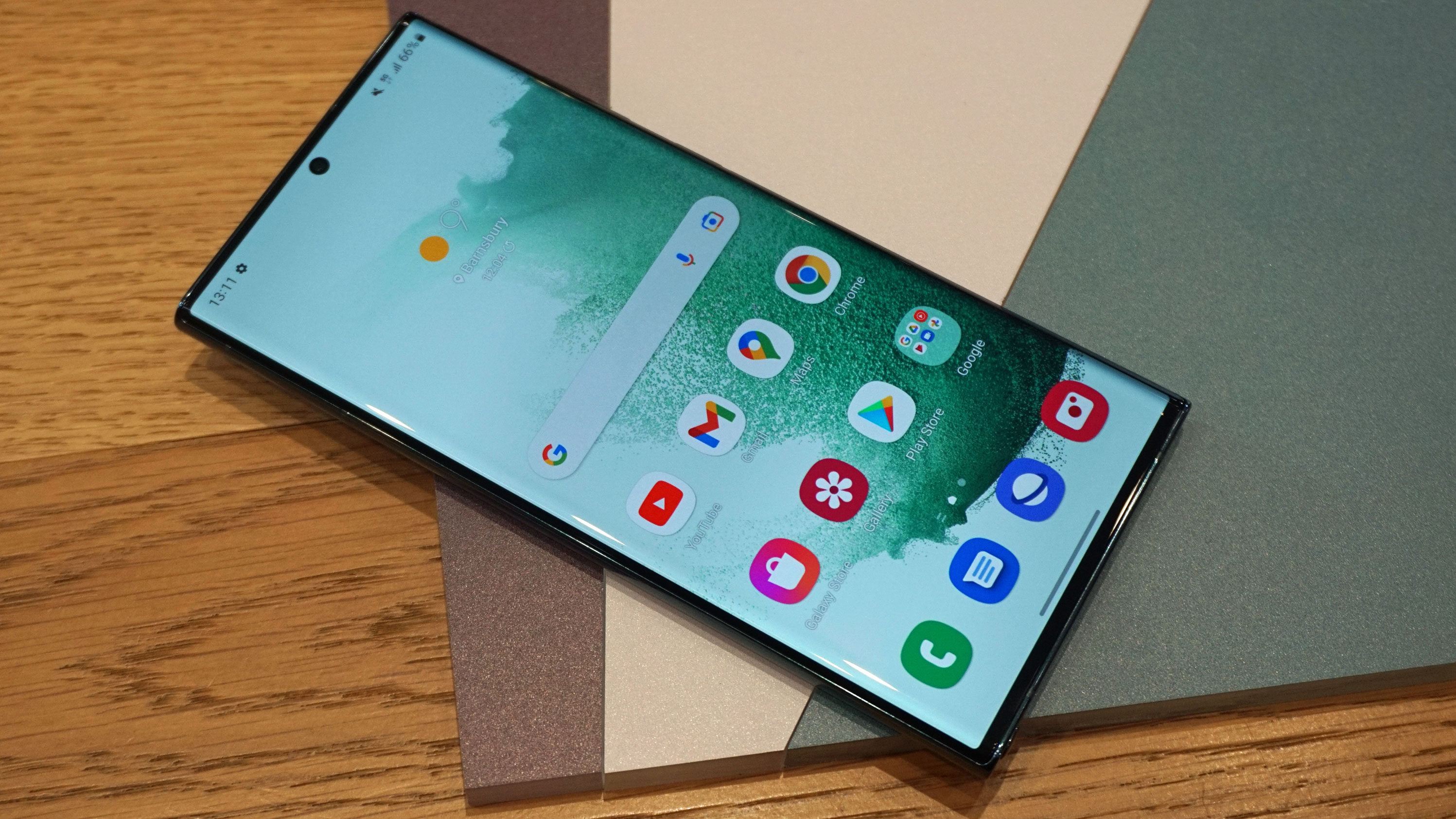
The Galaxy S22 Ultra has a very similar hardware set-up to the Galaxy S21 Ultra. That means a quad-camera system comprising a 108MP wide camera, a 12MP ultra-wide camera, and a pair of 10MP cameras.
Apple’s iPhone 13 Pro Max gives you a triple-camera system, each packing a 12MP sensor and covering wide, ultra-wide, and telephoto duties.
Given the relative lack of change to the hardware, Samsung is going to have to really bolster its AI algorithms and color science to be able to top the iPhone 13 Pro Max, which is pretty much the best camera phone on the market right now.
Apple’s natural colors, effortless point-and-shoot accuracy, and uncannily good night shots (aided by sensor-shift stabilization) are tough to beat.
The one area where we’re confident Samsung has won is the telephoto stakes. Its two 10MP sensors capture 3x and 10x zoomed shots, while Apple’s single 12MP telephoto only extends to 3x.
Put simply, the Galaxy S21 Ultra was better at zoomed shots than the iPhone 13 Pro Max, so it’s almost certain that its successor will at least maintain that gap.
Apple’s phones have always had the edge in video capture, and it introduced some nifty software/AI tricks with the iPhone 13 Pro Max. That includes support for the high-end ProRes video codec, as well as Cinematic Mode, which enables you to apply Portrait-like bokeh effects to footage and adjust the point of focus in post.
As for selfies, the Galaxy S22 Ultra has a 40MP sensor, while the iPhone 13 Pro has another 12MP sensor.
Samsung has a serious job on its hands overtaking the iPhone’s camera lead, but the Galaxy S22 Ultra will undoubtedly come to the fight with its own unique weapons.
Specs and performance
The Samsung Galaxy S22 Ultra packs a 4nm processor, whether you’re talking about the Snapdragon 8 Gen 1 or the Exynos 2200. The one you’ll receive depends on which region you live in. If you’re in the US, you’ll get Snapdragon while those in Europe and Australia will get the Exynos.
Early signs point to a marginal increase in performance over the previous chips, with the main gains coming from the GPU. We’ll be putting these claims to the test in due course.
If true, it’s likely that the iPhone 13 Pro Max will be the faster phone of the two. Apple claimed that its A15 Bionic chip was up to 50% faster than the Android opposition at the time of its launch. And as we’ve just discussed, the Galaxy S22 Ultra’s new chips don’t seem to provide that much of an advance.
We are interested to see how the Exynos 2200 performs in gaming terms, however. This is the first fruit of Samsung’s partnership with AMD, resulting in the same RDNA2 GPU architecture that you’ll find in the PS5 and Xbox Series X consoles.
This, technically, enables the Exynos-powered Galaxy S22 Ultra to throw about advanced ray-tracing effects. We’ll have to wait and see just how many game developers take advantage of this, but it’s exciting news for mobile gamers nonetheless.
It’s largely worthless comparing RAM capacities, given the different ways in which iOS and Android make use of their hardware resources. But for the record, the iPhone 13 Pro Max packs 6GB and the Samsung Galaxy S22 Ultra gives you 8 or 12GB.
Storage allotments are identical on both phones, with options for 128GB, 256GB, 512GB, or 1TB.
One final stand-out spec for the Samsung Galaxy S22 Ultra is S Pen compatibility. Samsung has gone back to its defunct Galaxy Note range and supplied the Galaxy S22 Ultra with a built-in stylus.
By contrast, the iPhone 13 Pro Max doesn’t have support for the Apple Pencil, and it would be an unwieldy
Battery
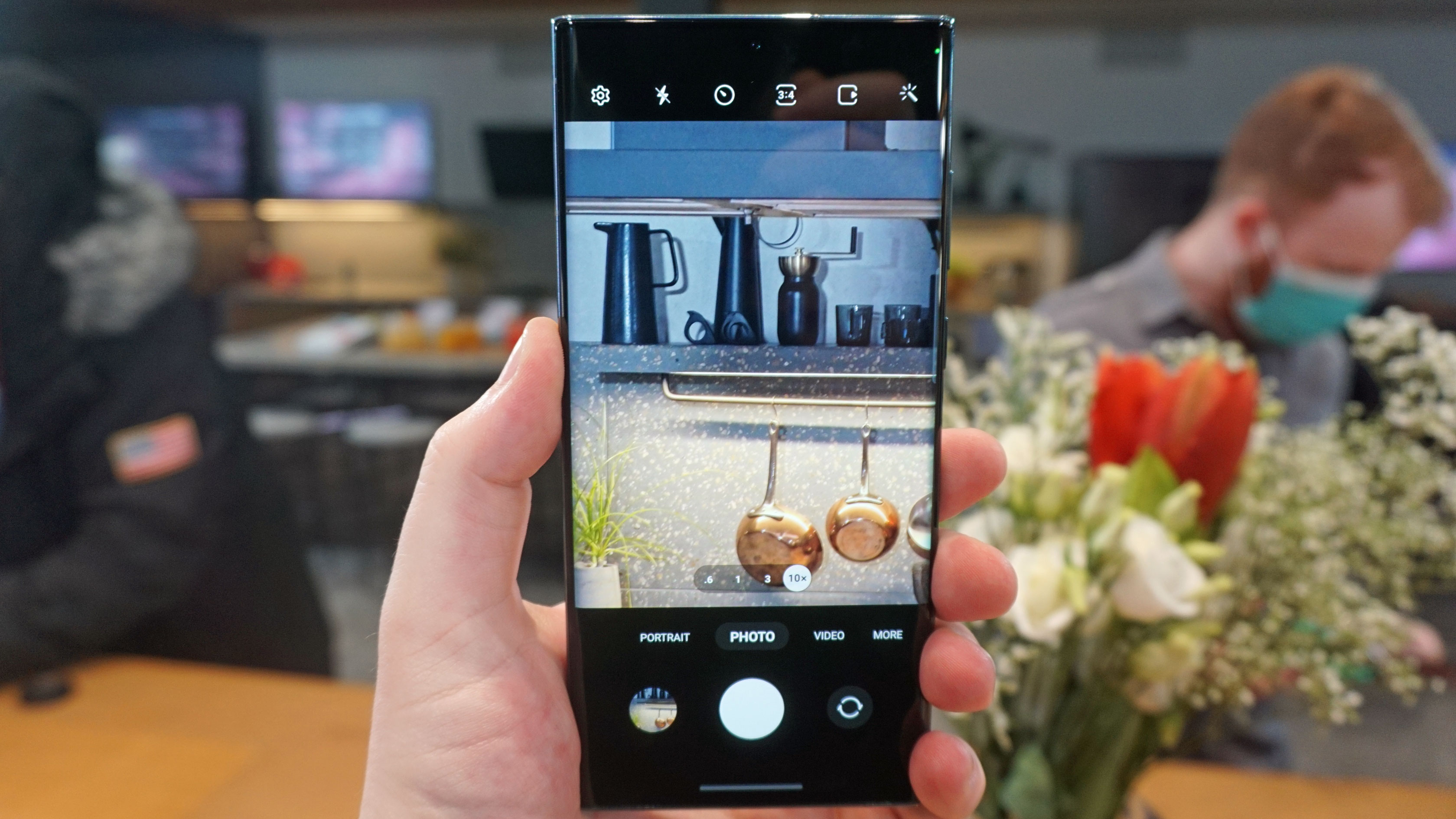
Samsung has given its latest flagship phone a 5,000mAh battery, which is much larger than the iPhone 13 Pro Max’s 4,352mAh cell.
It would be silly to take that as a win for the Samsung, however. We’ve already alluded to the different ways in which iOS and Android handle their resources and that has a bearing on battery usage too.
To illustrate that fact, we found the iPhone 13 Pro Max to have the best battery life of any iPhone we’ve ever used. We were able to go through a long day of intensive usage, and still have a third of a tank left.
Conversely, the Galaxy S21 Ultra – which also has a 5,000mAh battery – struggled to make it through a full day once we’d activated the 120Hz display.
We’re hopeful that Samsung has improved efficiency for the Galaxy S22 Ultra. It has a smarter display and a more efficient processor on paper, but the iPhone 13 Pro Max is asking some tough questions here.
Samsung turns the tables with its charging provision, though. The Galaxy S22 Ultra supports 45W charging, which is a huge boost from the Galaxy S21 Ultra. It’s also much better than the iPhone 13 Pro Max’s 27W.
Neither manufacturer bundles a charging brick in with their phones, however, which is a little annoying.
When it comes to wireless charging, the Galaxy S22 Ultra supports 15W, while the iPhone 13 Pro Max only stretches to 7.5W.
Buy a special MagSafe charger (Apple’s magnetic standard), however, and the iPhone 13 Pro Max can also hit 15W speeds.
Takeaway
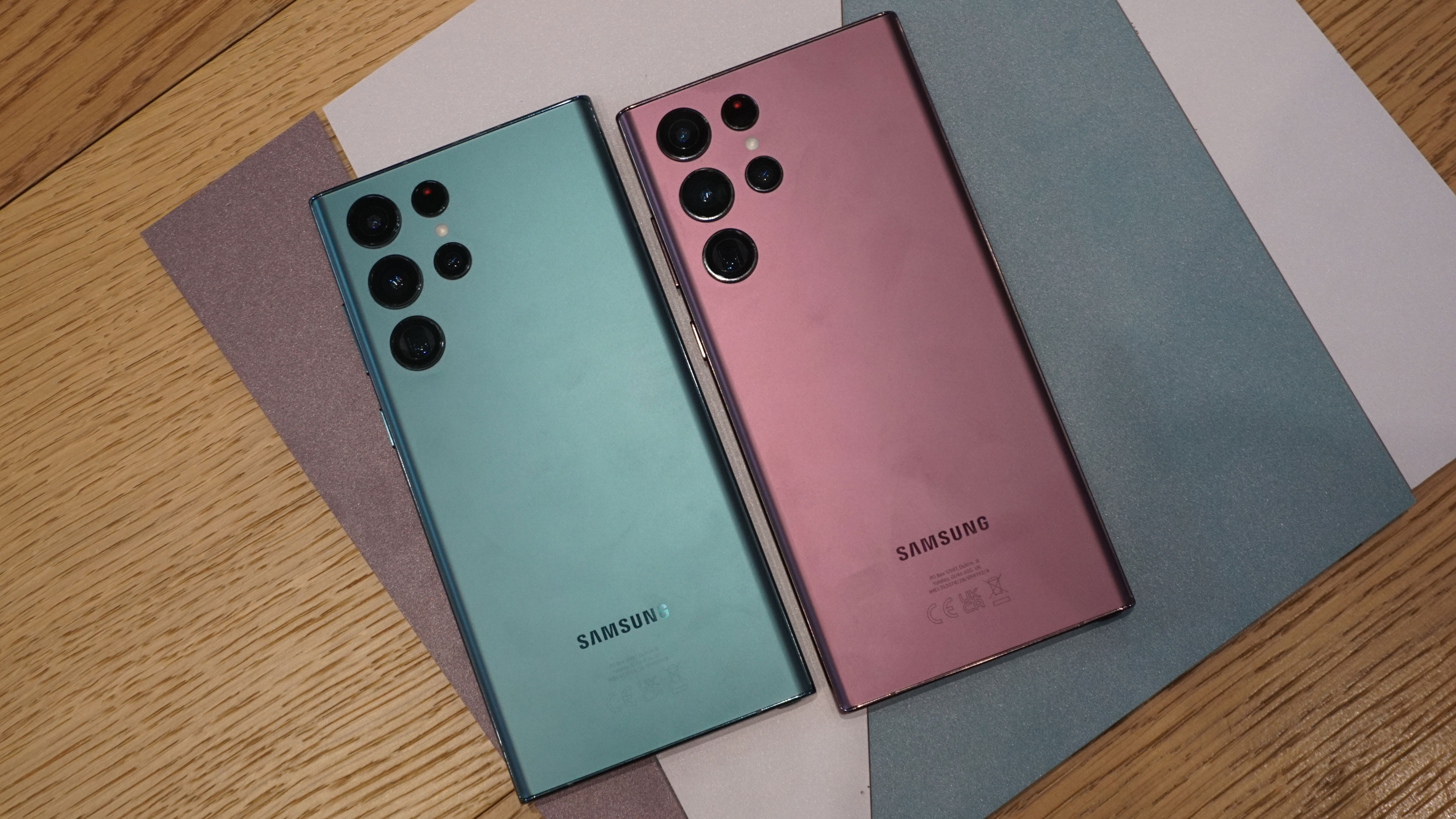
The Samsung Galaxy S21 Ultra and the iPhone 13 Pro Max were our top smartphone picks of 2021, and the Galaxy S22 Ultra looks set to seamlessly replace the S21 in the range for 2022.
Indeed, with superior S Pen integration and a switch to a sleek Galaxy Note-indebted design, it’s quite possible that Samsung will bolster its (really quite slim) lead over Apple.
The smartphone equation is rarely as simple as that, of course, and a potential lack of progress (on paper at least) in the camera and performance departments could sour the mood. It remains to be seen if Samsung can match Apple’s impressive leap forward in the stamina stakes, too.
We’ll update this comparison when we have hands-on experience with the Galaxy S22 Ultra. However, these two phones are almost certain to be vying for the top prizes for much of 2022.
For all the latest Technology News Click Here
For the latest news and updates, follow us on Google News.

